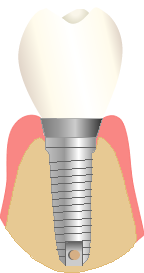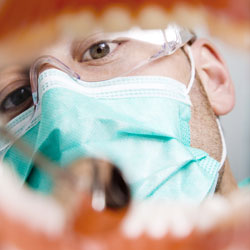 You may already know that periodontal disease can cause a number of undesirable conditions in your mouth – red, swollen gums and bleeding, to name a few – but did you know that it can also affect other areas of your body as well? At the office of Dr. Bobby J. Carmen in Norman, OK, we treat all stages of gum disease to help you avoid the potentially dangerous consequences associated with this common oral health condition.
You may already know that periodontal disease can cause a number of undesirable conditions in your mouth – red, swollen gums and bleeding, to name a few – but did you know that it can also affect other areas of your body as well? At the office of Dr. Bobby J. Carmen in Norman, OK, we treat all stages of gum disease to help you avoid the potentially dangerous consequences associated with this common oral health condition.
The Unexpected Connection
While the detrimental effects of periodontal disease are bad enough, the complications that can arise when the condition is left untreated are far worse. Aside leading to oral inflammation, pain and an increased risk of tooth loss, the bacteria that causes advanced gum disease can spread throughout your body and wreak havoc on vital organs and tissues. Some of the most common complications associated with untreated periodontal disease are:
- Pulmonary hypertension
- Rheumatoid arthritis
- Osteoporosis
- Coronary artery disease
- Heart attack
- Diabetes
- Stroke
- Low birth weight and preterm delivery (in mothers with periodontitis)
Fortunately, proper treatment of the infection can significantly reduce your risk of developing these often life-threatening conditions. Dr. Carmen’s preventative periodontal therapy can restore the health of your gums and teeth, protecting you from these and other diseases. Following treatment, you simply continue to brush and floss twice per day and visit the office every six months for routine checkups and cleanings.
If you or a loved one suffers from untreated periodontal disease and you’re ready to take the first step toward a healthier you, contact us at our Norman, OK office today to find out how Dr. Carmen can help you. We also serve patients throughout the surrounding areas of Moore, Central Oklahoma, the University of Oklahoma and beyond.


 If your smile is less than perfect – whether it be due to staining, crooked teeth or chips in the enamel – it can make you feel self-conscious in your daily interactions. You may even avoid smiling or laughing with others, hiding the condition of your teeth because you’re embarrassed of their condition. In our office in
If your smile is less than perfect – whether it be due to staining, crooked teeth or chips in the enamel – it can make you feel self-conscious in your daily interactions. You may even avoid smiling or laughing with others, hiding the condition of your teeth because you’re embarrassed of their condition. In our office in  For patients with one or more missing teeth,
For patients with one or more missing teeth,  Many dental patients are surprised to learn that the most common oral health ailment isn’t something simple like cavities or teeth grinding – it’s gum disease. In fact, a staggering 80% of the population is projected to suffer from a stage of this ailment. Also commonly referred to as a periodontal disease, gum disease is relatively harmless in its earliest stages, but if left untreated, it can lead to devastating consequences, including bone deterioration and tooth loss. That’s why it’s so important to attend regular check-ups here in
Many dental patients are surprised to learn that the most common oral health ailment isn’t something simple like cavities or teeth grinding – it’s gum disease. In fact, a staggering 80% of the population is projected to suffer from a stage of this ailment. Also commonly referred to as a periodontal disease, gum disease is relatively harmless in its earliest stages, but if left untreated, it can lead to devastating consequences, including bone deterioration and tooth loss. That’s why it’s so important to attend regular check-ups here in  If you suffer from fear or anxiety when faced with an upcoming dentist’s appointment, don’t worry – you’re certainly not alone. In fact, a majority of the population reports experiencing some level of dental phobia throughout their life. Here in
If you suffer from fear or anxiety when faced with an upcoming dentist’s appointment, don’t worry – you’re certainly not alone. In fact, a majority of the population reports experiencing some level of dental phobia throughout their life. Here in  Caring for the needs of someone who is disabled can often be a challenge. After all, there’s so much to account for and arrange that sometimes, tasks simply can’t help but fall to the wayside. Oral health, for instance, may be difficult to keep up with for a number of reasons, resulting in decayed or damaged teeth and diminished structure. Here at the
Caring for the needs of someone who is disabled can often be a challenge. After all, there’s so much to account for and arrange that sometimes, tasks simply can’t help but fall to the wayside. Oral health, for instance, may be difficult to keep up with for a number of reasons, resulting in decayed or damaged teeth and diminished structure. Here at the  Out of all the oral health problems a person can endure during their lifetime, bad breath is often considered both the simplest and the most embarrassing. After all, many of us have experienced the humiliation that comes when someone discreetly mentions you might need a breath mint. Even worse is the fact that bad breath can often be an indication of more serious problems, such as gum disease or cavities. If this condition is a common, frustrating element in your everyday life, contact your local dentist
Out of all the oral health problems a person can endure during their lifetime, bad breath is often considered both the simplest and the most embarrassing. After all, many of us have experienced the humiliation that comes when someone discreetly mentions you might need a breath mint. Even worse is the fact that bad breath can often be an indication of more serious problems, such as gum disease or cavities. If this condition is a common, frustrating element in your everyday life, contact your local dentist  While keeping your teeth and gums healthy is a must, of course,
While keeping your teeth and gums healthy is a must, of course,  Over time, patients often become familiar with several kinds of conditions and injuries that can negatively affect their dental health, from TMJ disorder to gum disease to even simple cavities. But have you ever stopped and wondered whether you might have oral cancer? While this condition isn’t discussed too often, the numbers surrounding it are staggering – this year, tens of thousands of people will be diagnosed with oral cancer, and half of them won’t survive longer than five years. This is because oral cancer isn’t often detected until its latest, most dangerous stage. Thankfully,
Over time, patients often become familiar with several kinds of conditions and injuries that can negatively affect their dental health, from TMJ disorder to gum disease to even simple cavities. But have you ever stopped and wondered whether you might have oral cancer? While this condition isn’t discussed too often, the numbers surrounding it are staggering – this year, tens of thousands of people will be diagnosed with oral cancer, and half of them won’t survive longer than five years. This is because oral cancer isn’t often detected until its latest, most dangerous stage. Thankfully,